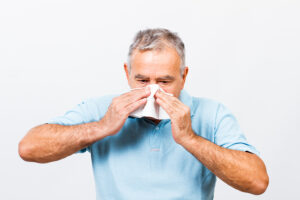Seniors who have seasonal allergies can also struggle with chronic sinus problems. When the seasons change or during the cold and flu season seniors are more likely to develop sinus infections. Sinus infections can be bacterial or viral. And no matter what the cause they can make seniors miserable for several weeks. Home care assistance providers can help seniors use home remedies to manage their symptoms.
The most common symptoms of sinus infections include:
-

Home Care Assistance Paradise PA – How Seniors Can Prevent Sinus Infections Bad breath or loss of smell
- Cough, often worse at night
- Fatigue and general feeling of being ill
- Fever
- Headache
- Pressure-like pain, pain behind the eyes, toothache, or tenderness of the face
- Nasal stuffiness and discharge
- Sore throat and postnasal drip
The treatment for a sinus infection depends on whether it’s bacterial or viral. Bacterial sinus infections may require antibiotics. But viral sinus infections need to just run their course. Home care assistance can help seniors prevent sinus infections.
The best things seniors can do to prevent sinus infections are:
Wash Hands Frequently
Good hand hygiene is the first line of defense against infections of all kinds, including sinus infections. Seniors should frequently wash their hands with soap and water, especially before touching their face, nose, or eyes, to prevent the spread of bacteria and viruses.
Drink Water
Proper hydration helps keep the nasal passages moist and functioning optimally. Seniors should aim to drink an adequate amount of water throughout the day to prevent the nasal passages from becoming too dry, which can make them more susceptible to infections.
Use A Humidifier
Using a humidifier in the bedroom or other commonly used areas can help maintain optimal indoor humidity levels. This can prevent the nasal passages from drying out, reducing the risk of sinus infections. It’s important to clean and maintain the humidifier regularly to prevent mold and bacteria growth.
Avoid Irritants
Seniors should be cautious about exposure to irritants that can trigger sinus problems. This includes cigarette smoke, strong odors, and airborne allergens. Reducing exposure to these irritants can help prevent sinus irritation and infections.
Take Allergy Medication
Seniors with allergies should take either prescription or over-the-counter allergy medications that are recommended by their doctor. Allergies can contribute to sinus issues, so using antihistamines, nasal corticosteroids, or other allergy medications can help prevent sinus infections.
Use A Neti Pot
Saline nasal irrigation can help clear mucus and irritants from the nasal passages, reducing the risk of infection. There are various over-the-counter saline nasal sprays and irrigation kits available for this purpose.
Boost the Immune System
Maintaining a healthy lifestyle can help strengthen the immune system, making it better equipped to fight off infections. Seniors should focus on a balanced diet, regular exercise, and adequate sleep to bolster their immunity.
Manage Chronic Conditions
Seniors with chronic conditions like asthma or diabetes should work closely with their healthcare providers to manage these conditions effectively. Poorly managed chronic diseases can increase the risk of sinus infections. Eating a healthy diet and getting enough rest are also important.
If you or a loved one are considering Home Care Assistance Services near Paradise PA, contact the caring staff at Extended Family Care of Lancaster. Call today at (717) 205-2174.
- Celebrating Milestones: Birthdays, Anniversaries, and New Additions! - November 28, 2023
- Symptoms Of ALS Seniors Shouldn’t Ignore - November 20, 2023
- The Best Teas For Your Senior This Fall - October 30, 2023

